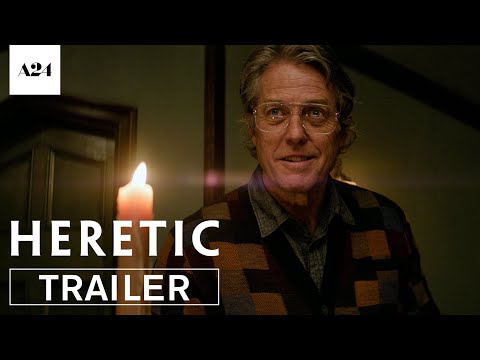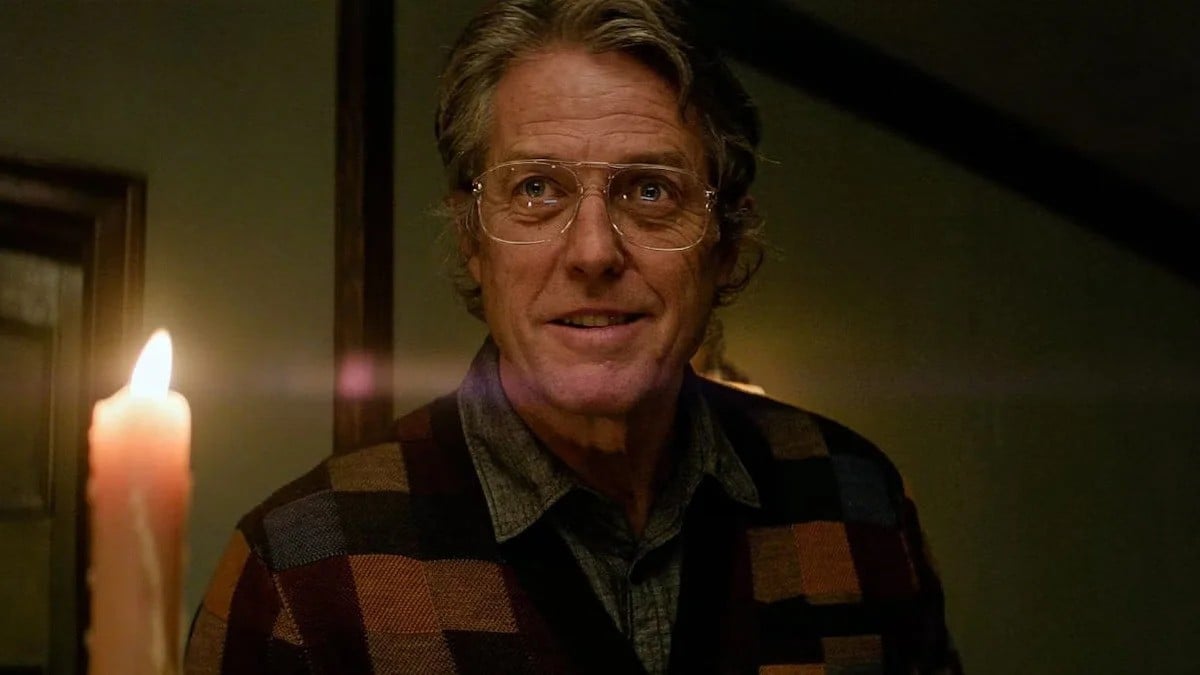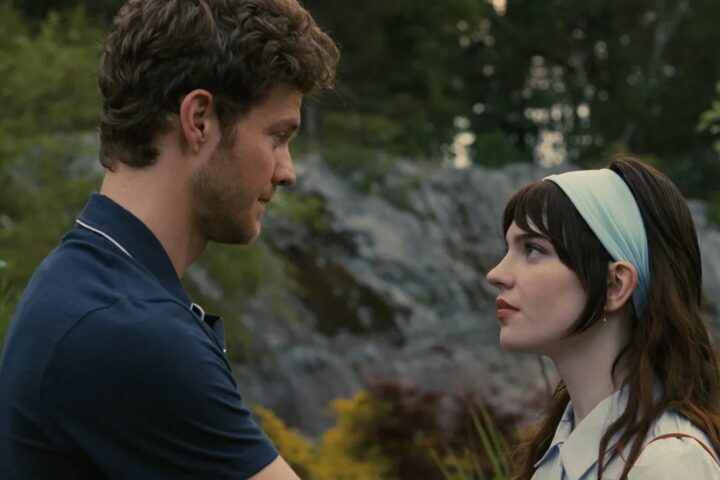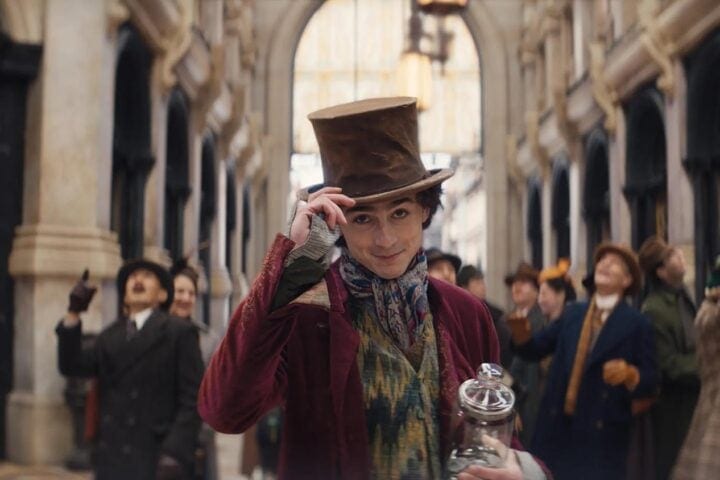Writer-directors Scott Beck and Bryan Woods’s Heretic suggests a Saw film with a cheeky religious twist. In this case, the twisted Jigsaw-like sadist behind the pitiless battle of wills is Mr. Reed (Hugh Grant), a mysterious atheist who lives in a small ornate rural home that will serve as the playing field, while the participants, Sister Barnes (Sophie Thatcher) and Sister Paxton (Chloe East), are young Latter-day Saint missionaries going door-to-door selling the word of God. While the mind game that follows may not involve elaborate torture mechanisms and extreme bloodletting, the girls will still be forced to make a series of fraught decisions as part of a perverse inquisition designed to break down their faith.
The young Mormons arrive on Mr. Reed’s doorstep at the onset of a sudden downpour, aptly setting the stage for what’s to come. A little kooky but seemingly benign and expressing interest in hearing what they have to say, Mr. Reed invites them inside, and the girls accept with the caveat that his wife, who’s apparently in the kitchen baking a blueberry pie, must join them due to their church’s strict rules (they can’t be alone with another man who isn’t their husband).
As soon as the front door portentously closes behind the girls, it’s readily apparent to any seasoned horror fan that this a trap. For the girls, though, it’s one they only begin to realize gradually once Mr. Reed’s significant other fails to appear (his explanation is that she’s shy) and their conversation moves from initial pleasantries to more invasive questioning on his part.
Heretic intriguingly plays with our expectations of who the heroes and villains are in this scenario. As Mr. Reed schools the girls in the Mormon Church’s hypocritical sense of morality, non-believers with an aversion to sanctimoniousness may appreciate the film as a kind of wish fulfillment fantasy. But the film also makes space to sympathetically highlight the embarrassment and isolation associated with growing up religious in a modern world that treats it like a joke (“That South Park musical really made fun of us,” Sister Paxton amusingly laments at one point), immediately making us feel protective of the girls, whatever their beliefs.
As Mr. Reed’s rhetoric becomes more disturbing and aggressive, the film expertly ratchets up the tension over what his intentions, if he has any at all, could possibly be. And through it all, Grant exudes the perfect balance of menace and charm as Mr. Reed delivers lengthy speeches in which he systematically dismantles the entire concept of religion to his literally captive audience. In essence, he’s like a malevolent Richard Dawkins—who, according to Beck and Woods, was an inspiration for the character—but it’s also hard not to be reminded of Patrick Bateman for the way Mr. Reed irreverently uses pop culture to prove his points.

Mr. Reed’s psychological sparring with Sisters Barnes and Paxton is one of the film’s chief pleasures, and Thatcher and East more than hold their own against Grant’s coiled intensity. When Mr. Reed offers the girls a choice between two doors that will take them through the house, one marked “Belief” and one “Disbelief,” a nail-biting stand-off of sorts ensues as Sister Barnes, the more grounded and wary of the two, and Sister Paxton, the agreeable optimist, attempt to work out their captor’s thought process and reach equal footing.
As Mr. Reed preaches his ideas of religion in what’s clearly a means of exerting control over the missionaries, it’s refreshing that the film gives the girls a sense of agency and individual willpower. Even if you were to believe that the girls were led into this situation by the very church that was supposed to save them, the filmmakers have the characters think through each subsequent dilemma instead of having them default to making illogically dumb decisions.
Meanwhile, the intricately designed house is a character in its own right, mirroring the girls’ mental state as Mr. Reed’s delivers his nightmarish theology lesson. In this way, Heretic signals back to Beck and Woods’s gripping breakthrough feature, 2019’s Haunt, which featured a strong female protagonist having to navigate her way through a labyrinthine house of horrors.
While Heretic’s lack of thematic subtlety isn’t necessarily a bug, at almost two hours, the film does begin to feel like it’s beating a dead horse a bit by the time we get to the last act. It also falls victim to the kind of over-explanatory flashback-heavy finales that are a signature of the Saw series, and it concludes with some schmaltzy sentiments about praying that ring more than a little hollow given the prankish nature of what’s defined the film up to this point.
But unlike Mr. Reed’s speechifying, Beck and Woods’s film avoids condescending to its audience and allows a creeping fear to arise slowly and naturally from the proceedings, mostly through words and looks than garish spectacle. Perhaps a bit more ambiguity in Heretic’s ending would have made the film soar into the heavens, but it still offers up a stimulating portrait of a hell forged through the rigidity of one person’s deranged view of the world.
Since 2001, we've brought you uncompromising, candid takes on the world of film, music, television, video games, theater, and more. Independently owned and operated publications like Slant have been hit hard in recent years, but we’re committed to keeping our content free and accessible—meaning no paywalls or fees.
If you like what we do, please consider subscribing to our Patreon or making a donation.







“That South Park musical really made fun of us” – no, it didn’t. It appears the writers never saw it. Generally, atheists – those who are convinced gods do not exist – get shafted in films, while religion gets a pass. Usually, there’s a non-believer whose philosophy is shown to be reasonable but far too harsh for religious viewers, so there’s an ending tacked on in which faith is made to seem more human and kind. As in, say, ‘Contact’ (1997). Is this because writers are sympathetic to supernaturalist beliefs, or is it to please a supposedly religious majority of viewers who would not want to see a faith-bashing film?
They’re fictional characters in a horror film. Why would you suppose they’re meant to be speaking a literal truth?